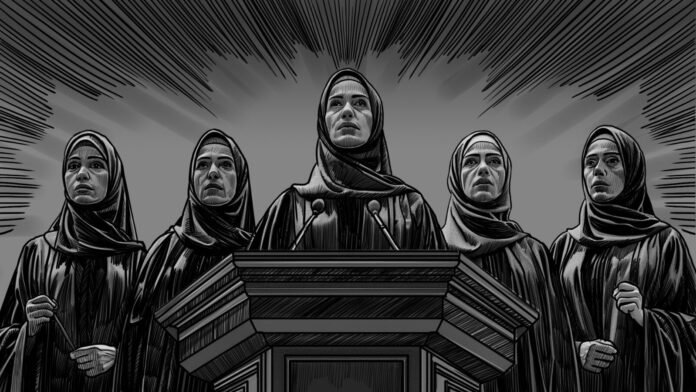Abu Bakra Nufay’ ibn Al-Harith narrates that Allah benefited him with a word he heard from the Messenger of Allah (peace be upon him) and remembered during the days of the Battle of the Camel. He almost joined the forces of Talha, Al-Zubair, and the Mother of the Believers, Aisha (may Allah be pleased with them), to fight with their party.
Abu Bakra recounts that when the Messenger of Allah (peace be upon him) was informed that the people of Persia had appointed the daughter of Khosrow (a title for their king) as their ruler, he said, “A people who entrust their affairs to a woman will never prosper.” Some have interpreted this hadith to mean that such people will not achieve success in their endeavours if they appoint a woman to lead them due to what they perceive as the deficiencies and incapabilities of women. In their view, women are not suited for managing the affairs of the people, and it is not appropriate for them to be given leadership or judicial roles.
On the other hand, the Quran highlights the wisdom and effectiveness of the leadership of the Queen of Sheba. This calls for a reconsideration of the traditional interpretation of the hadith that suggests a people led by a woman will not prosper. The Queen of Sheba proved that women can indeed succeed in leadership and bring prosperity to their people.
The Quran tells stories for lessons, not for entertainment, and in this case, the lesson is the possibility of successful female leadership. It also teaches us the importance of consultation, wisdom, and good governance.
The story of the Queen of Sheba is mentioned in Surah An-Naml. She was the woman who ruled this state in Yemen, south of the Arabian Peninsula, and she ruled with wisdom, tact, good politics, and sound management, leading her people to the good of both this world and the Hereafter.
The story indicates that she was a rational woman. When she received the letter from Solomon, peace be upon him, which said, “Do not exalt yourselves against me, but come to me in submission,” she gathered her people and consulted them, saying, “O chiefs, advise me in my matter; I never decide an affair until you are present with me.” She was a consultative woman, or in modern terms, democratic, and she did not impose her opinion.
The leaders of her people entrusted her with the matter, saying, “We are men of strength and great military might, but the decision is yours, so consider what you will command.” They gave her full authority, and she proved to be worthy of their trust.
The Quran then points out her wisdom when she says, “Indeed when kings enter a city, they ruin it and render the honour of its people humbled, and thus do they do.” She summarized what a colonizer does when they enter a country—they corrupt it and humiliate its people.
She then wanted to test the seriousness of Prophet Solomon; peace be upon him. She said, “Indeed, I will send them a gift,” from the jewels and treasures, to see whether they were people of worldly interests or genuinely religious. But Solomon rejected her offer, saying, “Do you provide me with wealth? But what Allah has given me is better than He has given you. Rather, you rejoice in your gift. Return to them, for we will surely come to them with soldiers they will be powerless to encounter.”
So the woman saw that wisdom dictated that she submit to Solomon and Allah, the Lord of all worlds. She accepted Islam, and her people benefited in this world and the Hereafter as she saved her people through her wisdom.
Thus, when the Quran mentions this story, it teaches us that women have brought success to their people through their leadership. Therefore, the hadith “A people who entrust their affairs to a woman will never prosper” should not be taken as an absolute rule, as stated by Imam Al-Shawkani in his book Guiding the Aspiring to Achieving the Truth in the Science of the Principles.
In an interview with Dr. Yusuf Al-Qaradawi on the Sharia and Life on Al Jazeera program, he mentioned the opinion of many jurists who have set conditions for those who assume judicial positions. These conditions include being a Muslim, reaching the age of maturity, possessing a sound mind, having integrity, and having intact senses. Among these conditions is masculinity, based on the belief that the judiciary requires sound judgment, which they claim women lack, and the ability to remain unaffected by emotions, as women are considered emotional.
However, Al-Qaradawi also stated that no clear, unequivocal text explicitly prohibits women from assuming judicial roles or that cannot be interpreted differently. He cited as evidence the view of the Zahiri school, which holds that women have the right to assume judicial positions. The Zahiris are known for their strict adherence to the literal meanings of texts and their strong defence of these interpretations. If an explicit, definitive text had prohibited women from becoming judges, the Zahiris, or Ibn Hazm, would have upheld it and fought for it. Thus, some permit women to assume judicial roles.
In a contribution to the same episode, Dr Ali Mohyuddin Al-Qaradaghi explained that Imam Abu Hanifa allowed women to assume judicial roles in matters where they can testify, specifically in civil, financial, and personal status matters, excluding criminal cases. Meanwhile, Imam Abu Ja’far Al-Tabari believed women can assume judicial roles in all issues.

The debate over women assuming judicial roles has persisted over the past centuries, but women have finally asserted themselves in the 20th century.
Dr Anas Sadoun writes on the Legal Agenda website that Moroccan women were “pioneers in ascending to the judicial bench in the Arab world, with the first female judge appointed in Morocco in 1961. Since then, women have proven their competence and ability to perform this difficult task, which has qualified them to advance in judicial responsibilities.”
Sadoun adds, “The number of women currently in the judiciary is 896 female judges compared to 3,154 male judges, representing 22.12%, a percentage that is increasing.”
However, he noted that “female judges are often assigned specific types of cases, such as family matters, juvenile cases, violence against women, and civil, social, and commercial cases, while they are rarely assigned to criminal or misdemeanour cases.”
Although Arab countries have managed to overcome the male-dominated barrier in the judiciary, women still hold judicial positions in limited numbers.
A report published by Al-Mirsal magazine on the status of women in the judiciary and their numbers in several Arab countries noted that, despite Palestinians appointing women as judges since 2009, “the number of female judges from that time until 2023 has not exceeded five women,” due to social and male-dominated considerations.
In Iraq, the percentage of female judges is less than 10% compared to the number of male judges, even though Iraq is one of the first Arab countries to allow women to hold judicial positions, with Zakia Ismail Hakki being the first woman appointed during the rule of Abdul Karim Qasim in 1959.
The report praised Lebanon, where “since the early 1990s, the Lebanese judiciary has seen a significant increase in the proportion of female judges, reaching parity with male judges today. According to international bodies, the percentage of female judges in Lebanon is the highest in the region.”
Women in the Gulf have also managed to assume judicial positions despite their political, social, and religious challenges.
Mohammed Jamal Al-Yousef’s article on the Thmanyah platform highlighted the development of women’s appointments in the judiciary. He mentioned that Bahrain is considered the first Gulf country “to open the doors of the judiciary to women in the Arabian Gulf.” In 2006, Mona Al-Kawari was appointed the first female judge by royal decree.
In the UAE, the Malaysian judge Tan Sri Dato’ Yakub was appointed in 2008 due to the absence of a qualified woman. However, Khulood Al-Dhaheri was appointed the second female judge in the Gulf in the same year. “She currently pleads before all courts of different levels, including civil, commercial, Sharia, criminal, and supreme courts,” as mentioned in an article on Arabian Business.
In Qatar, women were first appointed to the judiciary in 2010, with Hessa Al-Sulaiti becoming the first Qatari female judge.
In a 2015 speech to Qatar University graduates, Al-Sulaiti stated that “the general perception of society towards female judges has changed significantly from what it was in the past. The door is now open for everyone to join the judiciary.”
Women have not yet ascended to the judiciary in Oman and Saudi Arabia. Still, they have held various legal positions, such as lawyers in public prosecution and the public prosecutor’s office.

The United Nations is trending toward encouraging countries around the world to appoint female judges. The organization has even designated March 10th as the International Day of Women Judges to promote the role of women in this field. However, Arab countries still face social and religious pressures that limit this progress.
Today, women have been able to participate alongside men in all areas. They teach in colleges and universities, graduate generations of students, earn the highest degrees, and have been appointed ambassadors, ministers, and even prime ministers in some countries. They have assumed high-ranking positions that require decision-making abilities and the capacity to bear responsibilities, so nothing should prevent them from assuming judicial roles and adjudicating people’s rights.
The capabilities are present in both men and women, and both receive the same level of education and training. In fact, there are many issues related to women that men may not fully comprehend, and these issues may remain unresolved unless addressed by female perspectives.
Al-Yousef states, “a female judge is more qualified to understand the harm experienced by women than a male judge, which adds a humane aspect to some rulings that male judges might fail to grasp fully.”
He adds that “this is necessary because it gives female victims confidence that women have been placed in positions to help them achieve justice. It also raises awareness among women about their rights, knowing they are protected by the presence of women specialists who manage their cases.”
Although the percentage of female judges in Arab countries is low, except Lebanon, recent years have witnessed a significant change in women’s participation across various fields, including the judiciary. This is evidence that our societies have begun to embrace and integrate this social culture in all its forms.




